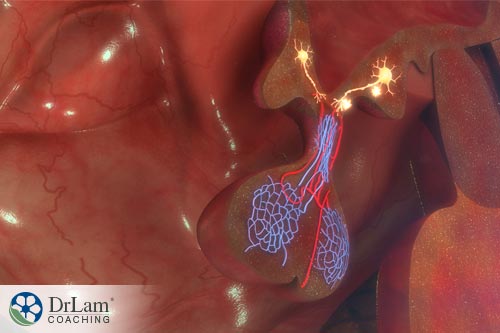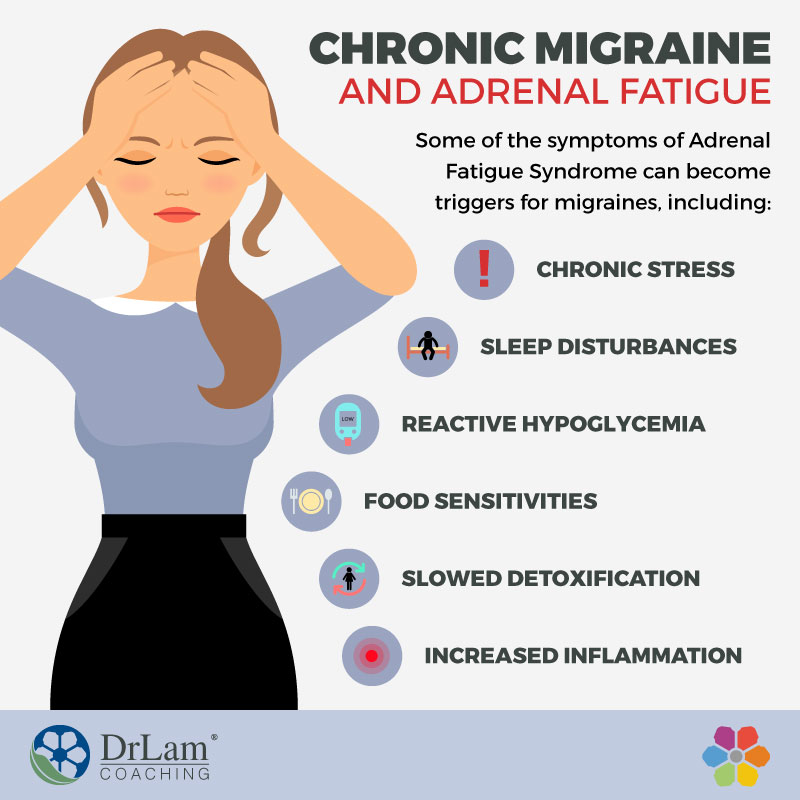 Migraines. The dreaded headaches that can keep you from going to work, playing with your kids, or even getting out of bed. They’re distinct from other types of headaches in the intensity of the pain, the accompanying symptoms, the possibility of a pre-attack aura, and in that they can affect one or both sides of the head. Chronic migraines can have the same triggers and phases as regular migraines, but can also be associated with other factors, such as adrenal fatigue, chronic stress, sustained use of certain medications, and estrogen dominance.
Migraines. The dreaded headaches that can keep you from going to work, playing with your kids, or even getting out of bed. They’re distinct from other types of headaches in the intensity of the pain, the accompanying symptoms, the possibility of a pre-attack aura, and in that they can affect one or both sides of the head. Chronic migraines can have the same triggers and phases as regular migraines, but can also be associated with other factors, such as adrenal fatigue, chronic stress, sustained use of certain medications, and estrogen dominance.
Migraines affect around 15% of the global population and their causes are unclear, though they seem to have some genetic factors as they can run in families, as well as environmental factors. They affect women three times more than men. It is thought that they cause pain by affecting nerves and blood vessels in the head and brain.
Migraines are known for their severity, with a pounding pain that is sometimes accompanied by other symptoms, including:
Doctors have mapped out three possible phases of migraine headaches, with some people experiencing all three while, more commonly, others experiencing the migraine attack only. The phases are:
Migraines can affect you for many years, especially between ages 20 and 55. They are not yet well understood, and they have no cure. Usually, doctors recommend taking painkillers and avoiding triggers.
If you suffer from chronic migraines, one of the best things you can do is map out the different types of triggers that you are sensitive to. Common ones include skipping meals, too much or too little sleep, too much exercise, alcohol (especially red wine), aged cheese, stress, too much caffeine, caffeine withdrawal, hormone changes, food additives, artificial sweeteners, perfumes and other strong odors, bright lights, and loud noises.
For a month or two, keep a diary on your migraines. Note things like if there was an aura, what the triggers were, your diet, any physical activity, stress levels, hormone changes (such as menstruation), how long it lasted, what medications you used, and anything else you can think of.
 When you have chronic stress, whether physical or psychological, your body’s global response to it – the NeuroEndoMetabolic (NEM) Stress Response – is constantly switched on. The NEM’s six circuits are all engaged in an effort to neutralize the harmful effects of stress, and none more so than the hypothalamic-pituitary-adrenal (HPA) axis.
When you have chronic stress, whether physical or psychological, your body’s global response to it – the NeuroEndoMetabolic (NEM) Stress Response – is constantly switched on. The NEM’s six circuits are all engaged in an effort to neutralize the harmful effects of stress, and none more so than the hypothalamic-pituitary-adrenal (HPA) axis.
The HPA axis is the main hormone cascade that goes into action whenever you’re exposed to a stressor. The control centers in the brain signal to the adrenal glands to secrete anti-stress hormones, especially cortisol.
With chronic stress, however, the adrenal glands are over-stimulated and overworked, and can begin to dysregulate. At first, they produce more and more cortisol, signaling the beginning stages of Adrenal Fatigue Syndrome (AFS). But once they are exhausted, their cortisol output drops, and this corresponds to the more advanced stages of AFS, characterized by a more debilitating condition and heavy fatigue.
Symptoms of AFS include tiredness, sleep issues, weight problems, mood disturbances, food sensitivities, low libido, PMS, infertility, heart palpitations, brain fog, and chronic inflammation.
The relationship between migraines and AFS goes both ways. Migraines can trigger or worsen AFS, and AFS can trigger or worsen migraines. Let’s take a look at each possibility.
The HPA and the rest of the NEM are moved into action whenever you are exposed to a stressor – whether physical or psychological. A migraine headache is both types of stressors rolled into one.
It is a physical stressor in that it has distressing physical symptoms that affect the hormones and neurotransmitters in the body. It is also a psychological stressor in that when you feel it coming, and you are mentally and emotionally distressed about the impending pain and inability to function normally for a few hours or even days.
When the HPA control center in the brain receives these messages, it uses neurotransmitters to signal to the adrenal glands to secrete cortisol. These neurotransmitters and cortisol flood the system and add to the soup of different hormones and chemicals already being prepared for the incoming migraine.
Now imagine this happening consistently and you see why chronic migraines affect the adrenals. Your HPA is constantly triggered into releasing different brain chemicals and adrenal hormones in order to deal with this recurring issue, eventually exhausting the adrenal glands and either causing or worsening AFS.
This is not to mention that if you suffer from migraines, you are probably already taking a cocktail of different painkillers and nausea-relief medications on a regular basis. Unfortunately, long-term use of these can lead to an excessive load on your detoxification response, clogging up your liver, extracellular matrix, kidneys, and other detoxification organs. This adds to the brain fog, memory loss, confusion and disorientation that migraine sufferers and AFS sufferers frequently experience. Withdrawal and dependency issues are common as well.

Those with AFS can experience an onset or worsening of migraines as well. First of all, chronic stress, the main culprit in AFS, is also a big factor in chronic migraines. Secondly, some of the symptoms of AFS can become triggers for migraines. For example:
 One of the biggest factors affecting chronic migraines is hormone imbalances, especially the progesterone-to-estrogen ratio. This may be one reason why women are three times more likely to suffer from migraines than men.
One of the biggest factors affecting chronic migraines is hormone imbalances, especially the progesterone-to-estrogen ratio. This may be one reason why women are three times more likely to suffer from migraines than men.
Estrogen is the hormone responsible for the proliferation of the endometrium, stimulation of the breast tissues and increasing body fat, while progesterone side effects is responsible for maintaining secretory endometrium, the usage of fat for energy, and the prevention of fibrocystic breasts and breast cancer.
In healthy women, estrogen and progesterone work together, keeping each other in check and maintaining a balanced ratio between them. With advancing age, plus a few other risk factors like diet, lifestyle, health conditions, xenoestrogen exposure, and stress, this delicate balance can be easily disrupted.
Although after age 35 both hormones begin to decline, the rate of decline of progesterone is about three times more than that of estrogen, making the relative amount of estrogen to progesterone much higher. This is called estrogen dominance, and it is responsible for many problematic women’s health issues.
The relatively low amount of progesterone as compared to estrogen in the system makes keeping estrogen in check much harder. With such elevated amounts of estrogen, you can experience symptoms such as:
 If you’ve been experiencing chronic migraines as well as some of the above symptoms, estrogen dominance may be the underlying cause. This is especially the case if you are taking birth control pills or hormone replacement therapy (HRT).
If you’ve been experiencing chronic migraines as well as some of the above symptoms, estrogen dominance may be the underlying cause. This is especially the case if you are taking birth control pills or hormone replacement therapy (HRT).
In fact, some types of HRT contain unopposed estrogen, like the drug Premarin, which makes estrogen dominance and its symptoms even worse instead of helping with menopausal symptoms.
It is also important to check if you have adrenal fatigue, as it often occurs concurrently in women with estrogen dominance. And they also share a few symptoms, such as weight gain, fatigue, PMS, infertility, and mood disturbances.
Other causes of estrogen dominance to be aware of are:
The good thing about this list is that if you take care of these issues, you are likely to experience a dramatic decrease in migraines as well.
First, if you already feel a migraine coming on, try some of these home remedies to see if you can rest and head it off.
As noted above, make sure that you record your migraines for a while so that you have some data on triggers, diet, and lifestyle changes that may be contributing to them. Also, if you suspect AFS, estrogen dominance, or other conditions to be underlying causes, make sure you go to the right kind of doctors to get checked out. Not all mainstream medical doctors are experienced in AFS, the NEM, or hormone issues, so if your tests come back negative, they may not dig any deeper even though you may indeed suffer from these problems.
Once you have a clearer picture, you’ll have a good idea of your options. With chronic migraines, prevention is always better than medication. And one thing you can do is to ensure your adrenals are strong enough to handle the migraines if they come and healthy enough not to add to your migraine problems.
 AFS recovery includes a healthy diet, mild to moderate exercise, enough rest, good quality supplements, and stress management – all things that can help with chronic migraines as well.
AFS recovery includes a healthy diet, mild to moderate exercise, enough rest, good quality supplements, and stress management – all things that can help with chronic migraines as well.
But please make sure that you are well aware of the effects of the supplements you choose, as some may be helpful for some conditions while aggravating others.
Also, it is really important not to overdo the painkillers unless absolutely needed. Taking painkillers frequently for a long time raises your risk of developing resistance to them as well as getting rebound headaches and an accumulation of chemicals in your system.
Finally, take steps to keep your detox system functioning, but make sure you are gentle on your body. A smooth detoxification response is vital to health in general, but especially for the prevention and amelioration of migraine headaches. If you decide to try a detox program, however, be aware that you may experience detoxification headaches. This is why it is always better to be supervised by experienced professionals when undertaking any big health and lifestyle changes.
© Copyright 2018 Michael Lam, M.D. All Rights Reserved.
Although the exact cause of chronic migraines is still unknown, there is a strong relationship between them and other common conditions, such as Adrenal Fatigue Syndrome and estrogen dominance. And improving one condition could help prevent or improve the other.

